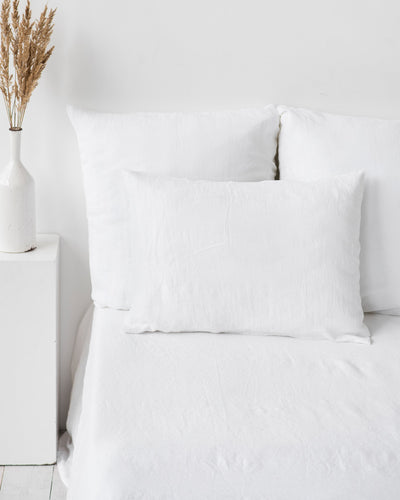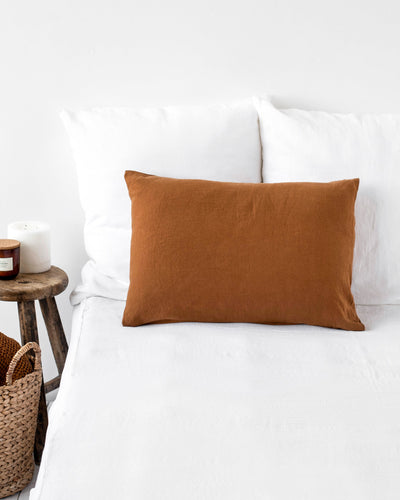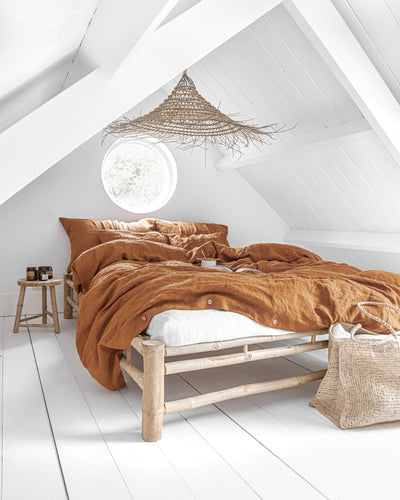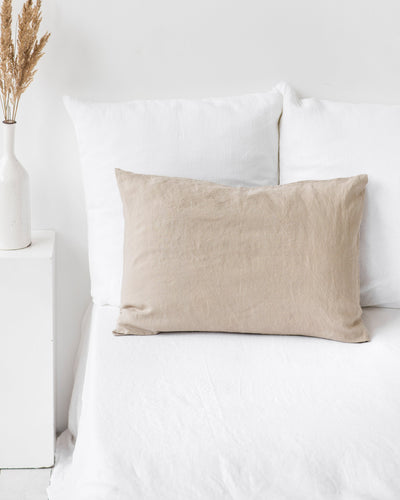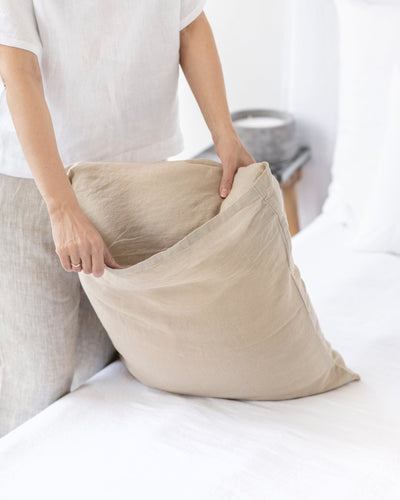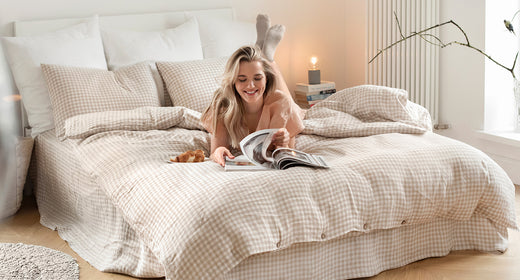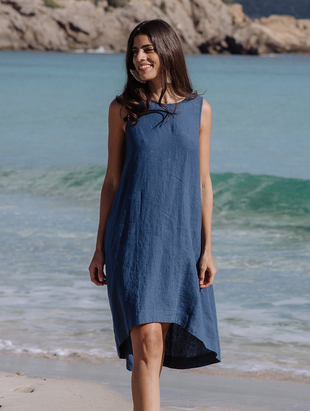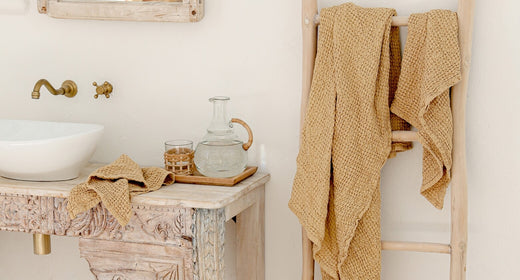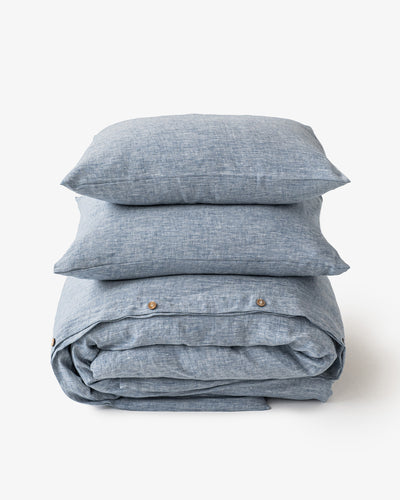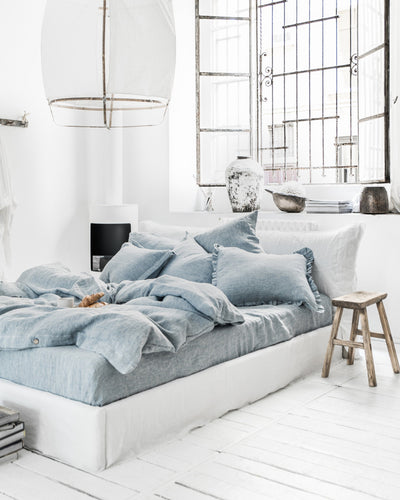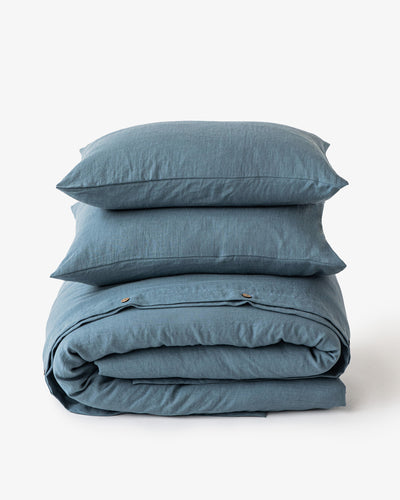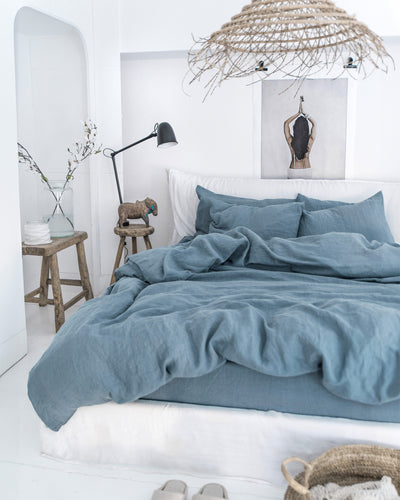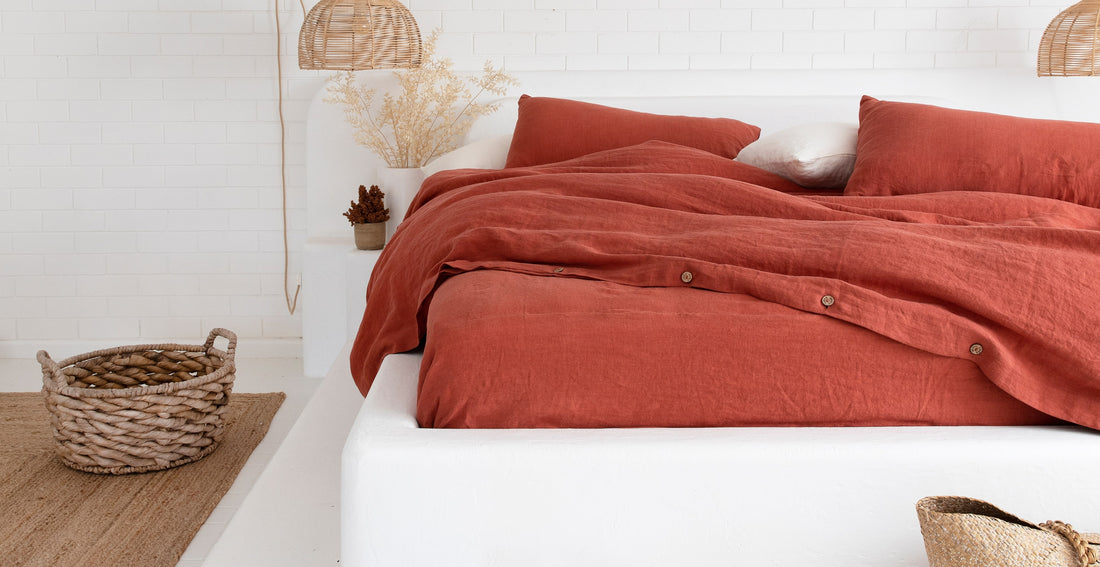
Duvet vs. Comforter: Key Differences & Which One to Choose
Achieving both a cozy and stylish bedroom is entirely possible when you select the right bedding. Among the many bedding choices available, duvets and comforters excel in providing warmth and comfort while enhancing the overall bedroom aesthetic. Despite often being used interchangeably, these bedding options have distinct features that set them apart. But how do you tell which is which?
Let us guide you on the duvet vs. comforter debate, show you what makes them unique, and help you make the right decision for a perfect night's sleep.
Key Takeaways
- Duvets are used with removable covers, making them easier to keep clean since only the cover needs frequent washing. However, inserting and aligning the duvet can be a hassle.
- Comforters are one-piece bedding options that don’t require covers, so they’re simpler to use but often bulkier and harder to clean, sometimes requiring professional care.
- Comforters are typically more affordable and come in pre-matched sets, making them great for quick decorating.
- Duvets offer more style flexibility with interchangeable covers and a plush, luxurious look, though they often come with a higher upfront cost.
Duvet vs. Comforter: Key Differences

Duvets are soft, flat bags filled with down, feathers, wool, or synthetic fibers, designed to be used as a top layer on your bed. Originating from Europe, duvets are typically used with a removable duvet cover—similar to a pillowcase for a pillow—which helps protect the inner filling and allows for easy cleaning.
On the other hand, comforters are thick, quilted blankets that are sewn shut and filled with insulating material such as polyester or cotton blends. Unlike duvets, comforters are typically used without a cover and are designed to be ready to use right out of the package. They’re usually styled with patterns or solid colors, so they serve as both a functional and decorative layer.
Although both duvets and comforters are excellent bedding options, they have significant differences that can make one better than the other for you. They mainly differ in the following:
Varieties and styles
Duvets allow for more flexibility in style because the cover is separate from the insert. This means you can easily switch out duvet covers to match changing seasons, trends, or personal tastes without needing to invest in a whole new bedding set. Duvet covers come in a wide range of fabrics, colors, and patterns—from crisp cotton and soft linen to luxurious silk or eco-friendly bamboo—giving you a lot of room to personalize your bedroom aesthetic.
Comforters usually come pre-designed with patterns, textures, or color schemes and are often part of coordinated bedding sets that include matching pillow shams and bed skirts. While this can make decorating easier for some, it does limit how often you can change up the look without buying a completely new comforter.
Warmth and insulation properties

Both duvets and comforters have warmth and insulation properties, but with clear distinctions. Duvets are known for their excellent insulation properties due to their fluffy filling, thus providing superior warmth during the colder months. During the warmer months, they can be paired with lighter duvet covers, making them versatile for year-round use.
On the other hand, you can also find comforters for year-round use, with lighter comforters ideal for warmer months. However, you might still need an additional layer during winter, as they're not as warm as duvets.
Ease of use and maintenance
Duvet covers are removable and washable, making it easy to keep your bedding clean without having to wash your duvet insert every so often. However, the process of putting on the duvet cover requires practice and effort.
Meanwhile, comforters don't need covers, so you don't have to go through the hassle of putting on additional covers. But keep in mind to check the care instructions when thinking of washing them. Not all comforters can be washed in a washing machine. Depending on the material, some might need dry cleaning.
Price and affordability
Price is another key factor that sets duvets and comforters apart. Generally, comforters tend to be more affordable, making them a great option if you're on a budget. They're often sold in bedding sets, which can offer good value for money.
On the other hand, duvets can be more expensive, especially those filled with natural down or made from high-end materials. However, they offer long-term value. Since duvet covers are replaceable and washable, you won’t need to wash the insert often or replace the whole set if the outer layer gets stained or worn out.
Pros and Cons of Duvets and Comforters

Pros of Duvets
Some of the advantages of choosing a duvet as a bedding option are:
- Comfort: Due to their fluffier nature, duvets offer exceptional warmth and comfort, creating a cozy sleeping environment.
- Versatility: You can find duvets in different fillings or thicknesses, depending on your needs. Furthermore, there's a wide range of duvet cover colors and patterns that can suit any aesthetic.
- Durability: High-quality duvets made with premium materials are durable and long-lasting, making them a great investment.
- Easy to clean: Because the insert doesn't directly touch your skin, you don't have to wash it as frequently as duvet covers. So, you can just remove the cover and throw it in the washing machine.
Cons of Duvets
At the same time, there are a few disadvantages to using a duvet:
- Price: Duvets can be pricey, especially when made with natural materials like down.
- Allergies: Duvets can trigger allergies when they're filled with down feathers. However, you can address this concern by choosing duvets filled with synthetic materials.
- Maintenance challenges: While the duvet cover might be easy to wash, it can be tricky to put on.
- Duvet drift: Duvets inserts tend to drift inside the cover after shifting and moving during the night, but it's nothing a good shake won't fix.
Pros of Comforters

Here are some of the advantages of choosing a comforter as your bedding choice:
- Coverage: Usually, comforters hang over the bed more than duvets, so you'll be safe from blanket snatchers.
- Ready to use: You can use your new comforter right out of the bag, as there's no assembly required.
- Versatility: You can find comforters in different thicknesses, allowing you to choose depending on the season and climate.
Cons of Comforters
Some disadvantages that might make you reconsider are:
- Bulky: Comforters can be too bulky for a household washing machine, so you might need professional help to get them cleaned.
- Additional layering: While they can be used year-round, during the colder seasons, you might need an extra blanket for warmth.
- Durability: As they need more frequent washing, comforters are more prone to wear and tear over time, leading to the weakness of the stitching or the filling clumping together.
When to Choose a Duvet vs. Comforter
Still unsure which bedding option is right for you? Your lifestyle, style preferences, and sleep habits can help you decide. Here are a few common scenarios to guide your choice:
Choose a duvet if you:
-
Love a luxurious, hotel-style bed: Duvets offer that fluffy, cloud-like look that instantly elevates your bedroom.
-
Enjoy switching up your decor: With easily changeable duvet covers, it's simple to refresh your bedroom style by season or mood.
-
Prefer lightweight layers with serious warmth: A quality duvet provides exceptional insulation without needing multiple blankets.
-
Don’t mind the occasional cover stuffing: If you’re okay with a little extra effort during laundry day, a duvet gives you more versatility and ease of cleaning.
Choose a comforter if you:
-
Want a grab-and-go bedding option: Comforters come ready to use with no assembly required.
-
Prefer a low-maintenance routine: There’s no cover to remove or wrestle with, making comforters ideal for those who dislike stuffing or folding.
-
Like a coordinated look: Comforters often come as part of a matching bedding set for a pulled-together aesthetic with minimal effort.
-
Have limited storage space: Since comforters are typically stored as-is, they work well for those who don't want to deal with separate inserts and covers.
Bottom Line
Whether you gravitate toward the plush luxury and versatility of a natural linen duvet or the simplicity and convenience of a comforter, the right choice ultimately depends on your lifestyle and sleep preferences. Duvets offer a clean, minimalist look with the freedom to change up your style as often as you like, while comforters bring ease and ready-to-use warmth with minimal fuss.
If you're leaning toward the elevated elegance of a duvet, why not wrap yourself in natural comfort and effortless style with premium linen bedding from MagicLinen? Their thoughtfully crafted duvet covers and bedding essentials bring a cozy, breathable, and timeless aesthetic to any bedroom—so you can sleep better and style smarter.
Explore MagicLinen’s collection today and find your perfect sleep companion.
Frequently Asked Questions (FAQs)
Can you use a duvet without a cover?
You can, but it’s not recommended. Duvet covers protect the insert and make cleaning easier.
What is better for hot sleepers, a duvet or a comforter?
Comforters are better for hot sleepers, especially lightweight ones made from breathable materials.
Which is easier to store: duvet or comforter?
Duvets are generally easier to store since they can be separated from their cover and compressed more easily.
 United States
United States
